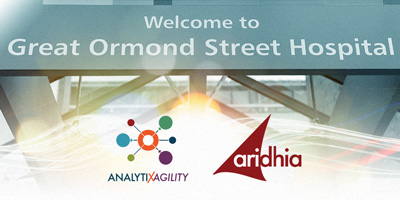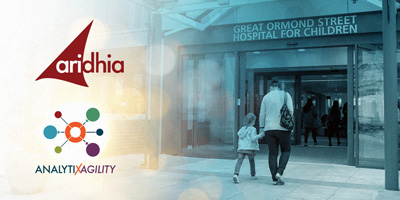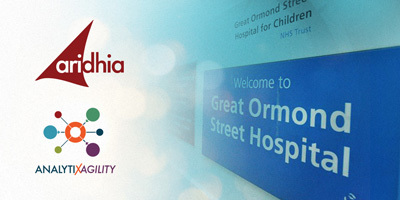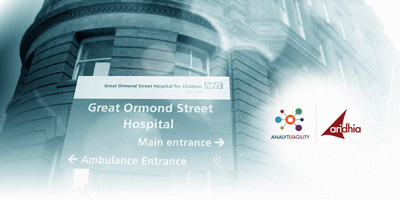Blogs & News
Enabling digital transformation and clinical innovation at Great Ormond Street Hospital: state of the art, data-driven research

Over the last month, Aridhia has been enabling researchers at Great Ormond Street Hospital (GOSH) leverage their Research and Innovation Platform, powered by the Ecosystem Edition of our AnalytiXagility platform.
In my role as part of the Enablement Team, I have been working closely with “early adopter” researchers at GOSH, and as part of this interaction, we have been discussing key aspects of good research practice, and how the new service will support them.
As a former researcher, I have first-hand experience of the challenges associated with increasing collaboration, getting access to powerful analytic tools, ensuring reproducibility and audit (supporting the FAIR principles to ensure that data is Findable, Accessible, Interoperable and Reproducible) and data security.
Let’s look at how AnalytiXagility is set to benefit GOSH researchers.
Accelerating the research process
As the complexity of research projects, collaborations and datasets increases, the time taken from project conception to clinical/scientific insight has grown enormously, with research findings taking an average 17 years to reach clinical practice. Using an integrated Research and Innovation Platform can speed the process up throughout, from data discovery, through data capture, cleaning, analysis and distribution. Integrating the way in which you capture data from trials with your analysis and collaboration tools not only prevents errors in data transcription between stages, but automates and speeds up the process. This leaves researchers to focus more on research tasks and spend less time on manually processing data.
This, above all else, is what gets researchers excited about using AnalytiXagility.
Increasing cross-functional collaboration
Tightly associated with the point above is collaboration. As it is increasingly rare for any clinical research to be conducted solely within one group, especially the type of pioneering paediatric research occurring at GOSH, platforms like AnalytiXagility enable researchers to bring a multidisciplinary team to their data, no matter how geographically dispersed they are.
With security in mind, controlled, role-based web access to individual projects within workspace sandboxes allow different stakeholders to have potentially differing levels of access to projects based on their role within it – whether as observer, contributor, standard or administrator users – providing multiple levels of data protection.
Social networking on a project scale can benefit collaboration efforts by increasing cross-functional communication and knowledge sharing. To facilitate this, comments, tagging and insight functionality enable efficient communication aligned with the specific files and data of interest within AnalytiXagility workspaces, while version control allows multiple users to work on the same files simultaneously.
Access to powerful analysis tools

With the service designed to be used by all members of a multidisciplinary team, the analysis tools must cater for a wide range of skillsets. This is the part of user enablement that is most interesting to me, as my interaction with researchers is heavily influenced by their goals and technical expertise. Since the range of expertise can be extremely wide, AnalytiXagility is an attractive proposition for organisations featuring extensive workforces with diverse skillsets.
To this end, the web interface has point and click interfaces for data visualisation, manipulation and table joining, for those who want a quick and simple way to interact with their data. In addition, the ability to design and deploy mini-apps – interactive applications that run R, but display the outputs in a user-friendly manner – offers a powerful way to expose less experienced team members to the data.
We must also be aware of the needs of more advanced users. The platform’s built-in SQL editor enables complex and rapid data manipulations, integrated with an R console, allowing scripted statistical analysis utilising the 10,000+ packages currently held in the CRAN repository.
Ensuring reproducibility and audit
A key requirement of any research collaboration is to ensure that research is reproducible. Part of my role is to demonstrate how the built-in tools and features help researchers work to FAIR data principles, so ensuring that data becomes Findable, Accessible, Interoperable and Reproducible.
The use of SQL databases to store and manipulate data ensures that any data transformations can be followed, reproduced and applied to other datasets in the future, allowing a “research workflow” to be developed. This is continued within data analysis, where using a scripted, comment-able statistical analysis language, such as R, enables the analysis applied to datasets to be kept separate from the data. This can then be re-used on other datasets with confidence that the exact same analysis is being performed.
Reproducibility is further supported through the use of “locking” and “snapshot” features.
While all data manipulation and analysis can be performed in such a way that it is reproducible, actions within a workspace are also captured in a comprehensive audit trail. This ensures accountability of all users, and keeps a record of all activity to provide confidence in the work produced within AnalytiXagility.
The platform also has an “airlock” feature that allows requested files or data to be approved by an administrator prior to being downloaded to a user’s computer.
Data security

While allowing users to access the platform via the web wherever they are has enormous benefits for productivity and flexibility, it does open the question of data security, and the auditability of the research process. To address this requirement, the service can be delivered from an N3 connected secure cloud datacentre – as it is in the case of GOSH’s research and innovation platform – and includes an integrated data de-identification service. Combined with the tiered user roles, multi-factor authentication, encryption and comprehensive audit log, data security and traceability is actively managed.
Platform accelerated approach to research

While GOSH have recognised the potential of AnalytiXagility to accelerate research throughput whilst also increasing research quality and ethical rigour, the challenges faced by this one research institute/hospital are not unique. Any institute or business that analyses or handles privileged data must consider and overcome these same challenges.
My experience of enabling researchers to effectively use these tools highlights the enthusiasm they have for a platform approach such as this. In many cases I can see their minds racing ahead, thinking of all the things they wish they could be doing with their data that have now become possible. Seeing this certainly adds to a sense of job satisfaction!
As the pace of technological change increases, and the size and complexity of data assets grows ever larger, integrated, scalable platforms such as AnalytiXagility will become more essential to obtaining insight from clinical – or any – data. GOSH are taking a leading role and are looking to the future of a broadly accessible, platform accelerated approach to research.
August 29, 2017
james
James joined Aridhia in early 2017, having completed his PhD in Experimental Child Health at UCL Great Ormond Street Institute of Child Health. His real-world insights into translational research drive and inform the Enablement team, providing a research perspective on the uses and opportunities provided by AnalytiXagility services. Outside of work, James challenges himself participating in long distance triathlons and running events for various charities.
